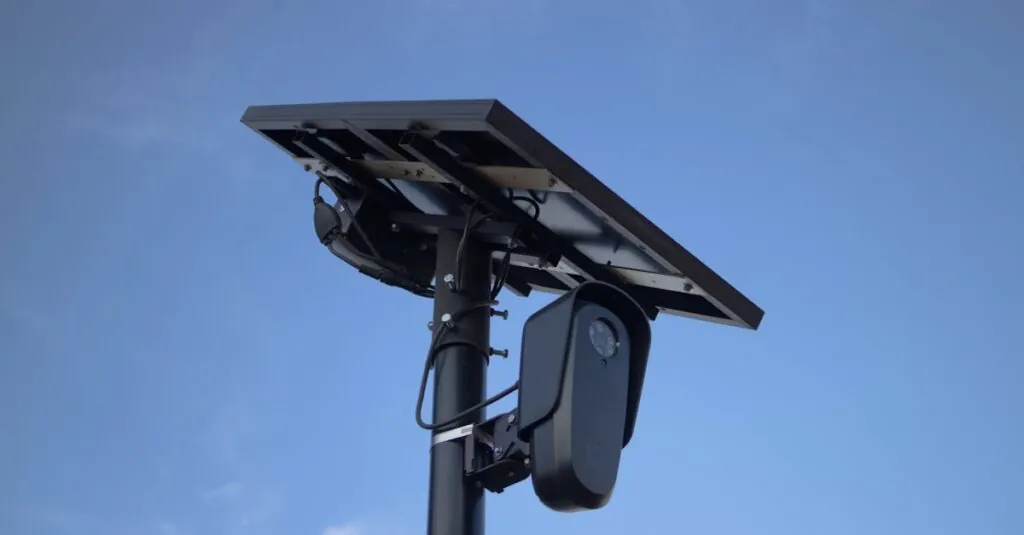In a world where crime dramas dominate our screens, it’s easy to think that security systems are just for the stars of those shows. But let’s face it—nobody wants to become the next plot twist in a neighborhood thriller. Installing a security system isn’t just smart; it’s essential for peace of mind. After all, who wouldn’t want to keep their home safe from unwanted guests while binge-watching their favorite series?
Imagine this: you’re cozy on the couch, popcorn in hand, when suddenly you hear a noise. Instead of jumping to conclusions and imagining a villain lurking in the shadows, you can rest easy knowing your security system’s got your back. From smart cameras to alarm systems, modern installations offer a fortress of protection. So, let’s dive into the world of security system installation and discover how to turn your home into a safe haven without compromising your Netflix time.
Table of Contents
ToggleImportance Of Security System Installation
Security system installation serves as a foundational aspect of modern home safety. Homeowners benefit significantly from the presence of reliable security systems. Projected data shows that homes without security systems are three times more likely to be broken into. These statistics underline the necessity of investing in effective security measures.
Making informed choices becomes vital when selecting a security system. Options include smart cameras, motion detectors, and alarm systems that provide real-time alerts. Such systems empower homeowners to monitor their properties remotely. Enhanced visibility fosters a sense of control over home safety.
Comfort plays a critical role in everyday life. A well-installed security system alleviates worries about intrusions, allowing families to enjoy their leisure moments. Feeling secure contributes positively to mental well-being and overall quality of life.
Installation should be approached with care. Professional installation ensures that each component operates cohesively. Incorrect setup can lead to vulnerabilities that might compromise security.
Regular maintenance of security systems cannot be overlooked. Routine checks ensure all components function correctly, enhancing overall reliability. This proactive approach can prevent minor issues from escalating into significant security risks.
Investing in security systems reflects a commitment to home safety. With advancements in technology, modern systems are often more accessible and user-friendly. The choice to prioritize home security ultimately protects loved ones and valuable possessions.
Types Of Security Systems
Security systems come in various types, each designed to meet specific needs. Understanding these options helps in making informed decisions.
Wired Security Systems
Wired security systems utilize physical cables to connect each component. These systems often provide reliable and consistent performance due to a direct connection to power sources and networks. Installation can require professional expertise, as running wires through walls and ceilings may be necessary. Wired systems frequently allow for comprehensive monitoring of property, integrating alarms, cameras, and motion detectors. Although initial installation can be more labor-intensive, the long-term benefits often include reduced maintenance and improved reliability.
Wireless Security Systems
Wireless security systems operate without physical cabling, using radio signals to communicate between devices. These systems offer flexible installation options, allowing homeowners to easily relocate components as needed. Wireless technology simplifies setup, making it accessible for those who prefer DIY solutions. Additionally, many wireless systems incorporate smart technology, providing remote access through apps. While they may require battery maintenance, advancements in technology typically lead to enhanced reliability. Homeowners often favor wireless systems for their ease of use and modern features.
Factors To Consider Before Installation
Security system installation involves careful consideration of various factors to ensure optimal performance and effectiveness. Understanding these factors helps homeowners make informed choices.
Budget Constraints
Budget constraints significantly influence the choice of security systems. Costs include equipment, installation, and ongoing monitoring fees. Assessing the overall budget before making a decision helps in selecting a system that fits financial capabilities. Many options exist at various price points, including affordable DIY systems and premium professional installations. Homeowners should prioritize essential features over unnecessary extras to maximize value without overspending. Additionally, considering long-term maintenance costs remains crucial, as these can impact overall budgeting over time.
Property Size and Layout
Property size and layout play essential roles in security system effectiveness. Larger properties may require more cameras or sensors to cover all key areas comprehensively. Assessing entry points, windows, and vulnerable locations ensures that each system component works effectively. Unique property layouts can present challenges; thus, adapting the security design becomes important. Placement of cameras and motion detectors must account for potential obstructions and blind spots. Understanding these spatial dynamics allows homeowners to create an accessible and efficient security solution tailored to their specific environments.
Steps For Effective Installation
Effective installation is crucial for a security system to operate efficiently. Homeowners can opt for professional services or consider DIY options based on their skills and preferences.
Professional Installation Vs. DIY
Professional installation offers expertise and ensures that all components function optimally. Technicians understand complex wiring and can customize setups for various properties. Using expert services reduces the chance of errors that might compromise security. DIY installations grant flexibility and often save money. However, homeowners with limited experience may face challenges with configurations and placements. If choosing the DIY route, it’s vital to follow manufacturer guidelines closely for optimal performance.
Key Components To Include
Essential components make up an effective security system. Cameras serve as the eyes of the surveillance, providing real-time visuals for monitoring. Alarms send alerts during unauthorized access, ensuring quick responses. Motion detectors activate when movement is sensed, adding another layer of security. A control panel centralizes system management, allowing users to monitor and control devices easily. Homeowners should also consider incorporating window and door sensors that alert when entries are compromised. Each component plays a significant role in creating a robust security solution.
Maintenance Tips Post-Installation
Regular maintenance ensures that security systems operate at peak performance. Owners should check all components frequently to confirm functionality. Inspect cameras for dirt or obstructions that might hinder their view. Replace batteries in wireless devices every six months or when they show signs of low power.
Additionally, testing alarm systems monthly helps identify any malfunctions. This practice ensures that alerts function properly during emergencies. Cleaning and maintaining sensors prevents false alarms, increasing reliability.
Experts recommend updating software for smart security systems to protect against vulnerabilities. Installations often feature user interfaces that benefit from the latest security patches. Monitoring settings allows homeowners to customize notifications and settings according to personal preferences.
Keeping a log of maintenance activities assists in tracking system performance over time. This log should document any issues, repairs, and adjustments made.
Consulting with security professionals during routine checks provides an extra layer of reassurance. Such expert inspections can uncover not easily visible vulnerabilities.
Being proactive about maintenance enhances the overall effectiveness of a security system. Addressing potential weaknesses ensures constant protection for homes and families.
Conclusion
Investing in a security system is a proactive step towards ensuring safety and peace of mind. By understanding the various options available and considering factors like budget and property layout, homeowners can tailor their security solutions to meet their unique needs. Whether opting for professional installation or a DIY approach, the effectiveness of the system heavily relies on proper setup and ongoing maintenance. Regular checks and updates help maintain optimal performance and protect against vulnerabilities. Ultimately, a well-installed security system not only safeguards loved ones and possessions but also enhances overall quality of life, allowing homeowners to enjoy their spaces without worry.





